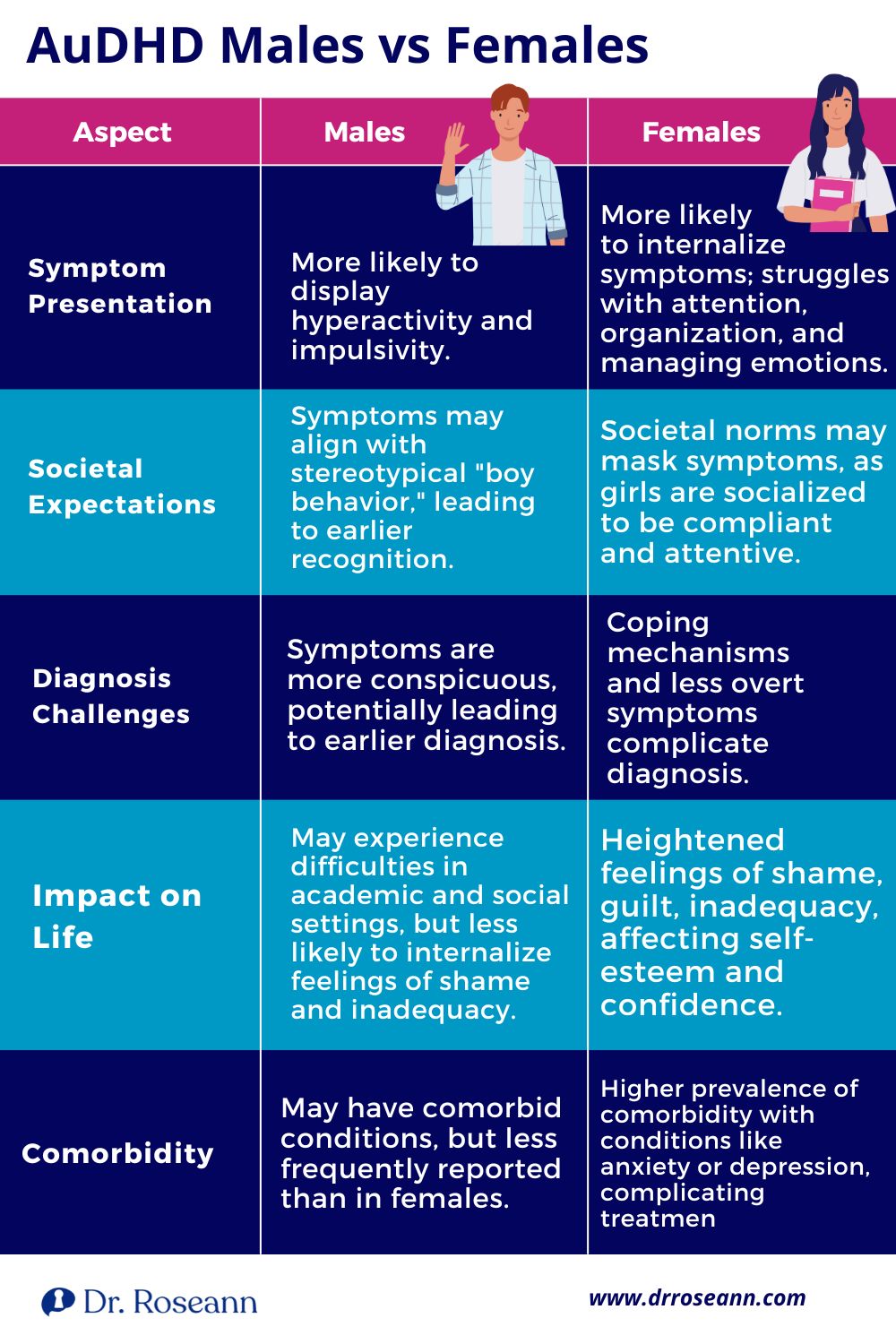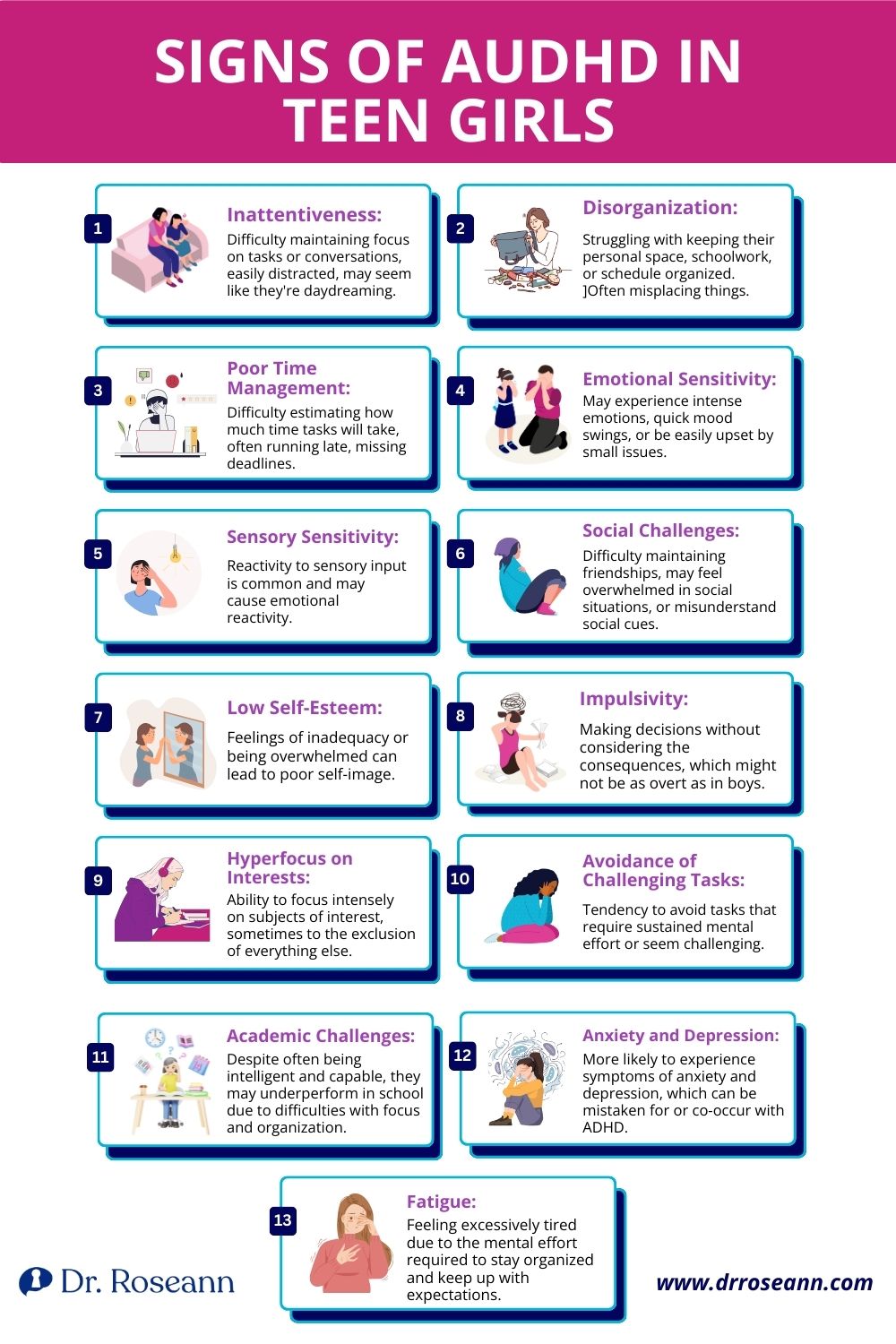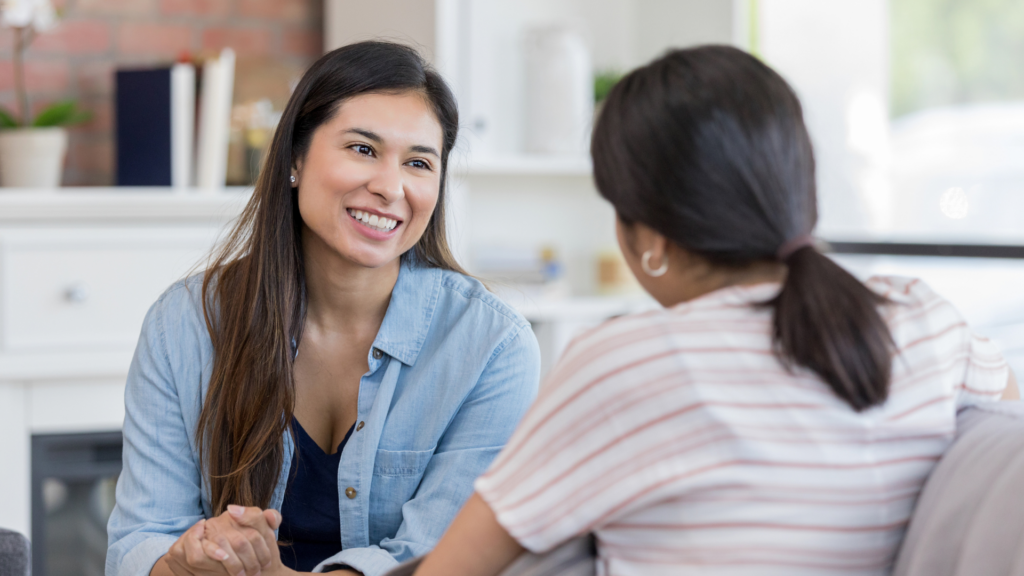AuDHD is a blend of Autism Spectrum Disorder (ASD) and Attention Deficit Hyperactivity Disorder (ADHD). In my work as a psychologist in my Ridgefield, CT clinic, I've witnessed the unique challenges and triumphs of AuDHD in women and adolescent girls with this complex issue with combined attention and social communication difficulties.
Gina, a bright and imaginative 16-year-old girl, walks into my office with her parents. As they describe her struggles with social interactions and focus, I can't help but see echoes of countless other girls I've worked with over the years. Gina’s story is familiar yet uniquely hers, which is a sprinkle of strengths and challenges shaped by her journey with AuDHD.
Gina came to me seeking answers after years of feeling misunderstood. Despite her intelligence and creativity, she struggled to maintain friendships and stay organized. Through our sessions, she began to unravel the complexities of her AuDHD and learned strategies to navigate the world with greater skills, confidence and resilience.
After completing the BrainBehaviorResetTM Program, Gina learned how her AuDHD influenced her experiences and found ways to harness her strengths and embrace her neurodiversity while managing her challenges. The hardest part for Gina was managing sensory issues and seeing others perspectives.
Her story, and countless others, shows the importance of recognizing the unique presentation of AuDHD in girls and women. Too often, their symptoms are overlooked or misunderstood, which causes frustration and isolation. She was labeled “moody and difficult” but in reality she has sensory issues and misperceived social communications. But with proper support and understanding, your teen can unlock her full potential and thrive, just like Gina, now that she’s a happy adult who knows herself.
What are the AuDHD Symptoms in Women?
The signs of AuDHD in women can vary widely. Here’s an AuDHD in women checklist that includes the most common indicators:
- Difficulty with social communication and interaction, such as making eye contact, understanding social cues, and maintaining friendships.
- Hyperfocus on specific interests or topics, to the point of obsession.
- Impulsivity and difficulty regulating emotions, leading to meltdowns or outbursts.
- Executive functioning challenges, such as disorganization, forgetfulness, and difficulty with time management.
- Sensory sensitivities or aversions, such as being overwhelmed by loud noises or certain textures.
But diagnosis is just the beginning. The journey of navigating AuDHD requires patience, compassion, and a willingness to embrace the unique strengths and challenges of each individual.

Is AuDHD Different in Males and Females?
The differences in AuDHD presentation between males and females can lead to challenges in identifying and diagnosing the condition accurately. While hyperactivity and impulsivity are often more conspicuous in males, females may internalize their symptoms (Craddock, 2024).
For instance, instead of exhibiting overt signs of restlessness or acting out, females may struggle with maintaining attention, staying organized, or managing their emotions, which can easily be overlooked or attributed to other factors.
Moreover, societal expectations and gender norms may influence how AuDHD symptoms are perceived and interpreted. Girls are often socialized to be more compliant and attentive, which can mask their struggles with attention and impulsivity. As a result, females with AuDHD may develop coping mechanisms to compensate for their challenges, further complicating the diagnostic process.
Furthermore, the impact of AuDHD on females' academic, professional, and personal lives can differ from that of males. Females may experience heightened feelings of shame, guilt, or inadequacy due to their difficulties, leading to issues with self-esteem and self-confidence.
Additionally, the comorbidity of AuDHD with other mental health conditions, such as anxiety or depression, may be more prevalent in females, worsening their challenges and complicating treatment approaches.
How to Know if Your Teen has AuDHD
To know if your daughter has AuDHD, the first step is to consult with a qualified healthcare professional, such as a psychologist or neuropsychologist, who can conduct a comprehensive evaluation. This might include assessments for both ASD and ADHD, as well as input from teachers and family members.
But here's the thing – AuDHD is often underdiagnosed in girls and women, especially when symptoms overlap or present differently than in boys. That's why parents must advocate for their daughters and seek out proper evaluation and support.

How to Manage and Support AuDHD in Women
Once a diagnosis is confirmed, the journey may be challenging. But there's plenty of hope and support available. Here are some strategies and interventions that can help manage the symptoms of AuDHD in adult women, but they’re as effective for children and teens:
1. The Right Intervention for Unique Brains
Individualized therapy, such as cognitive-behavioral therapy (CBT), social skills training, and occupational therapy, can address specific challenges related to ASD and ADHD. These interventions not only address specific challenges related to AuDHD but also empower individuals to navigate the complexities of life with confidence and resilience.
2. Supportive Environment at Home, School and Work
Creating a structured and predictable environment at home and school, with clear routines and visual supports, can help reduce anxiety and improve functioning. These can significantly reduce anxiety levels and enhance overall functioning. This consistency fosters a sense of security and stability, empowering individuals to better manage their challenges and thrive in their daily lives.
3. Knowledge and Advocacy
Empowering girls and women with AuDHD involves not only providing education about their condition but also advocating tirelessly for the accommodations and support they need in various settings.
Fostering a deep understanding of AuDHD allows your teen to advocate for herself confidently, ensuring that her unique needs are met in academic, professional, and social environments. Through education and advocacy, we can break down barriers, challenge stigmas, and create inclusive spaces where girls and women with AuDHD can thrive and shine.
But above all else, remember this: your daughter is not defined by her AuDHD. With patience, understanding, and support, she can embrace her unique strengths and thrive in her way. As a parent, you play a crucial role in this journey. Your love, understanding, and advocacy can make all the difference in empowering your daughter to embrace her true potential.
How to Support a AuDHD Teen
The AuDHD brain has many assets but parenting through the challenges can be hard. That is exactly why I created The Natural ADHD Focus Formula Kit, so parents can get guidance from a professional that has worked with thousands of children and families.
The kit offers accurate information and a clear strategy to enhance your child's strengths while addressing their needs. Embrace this opportunity to empower your teen with ADHD by starting with The Natural ADHD Focus Formula Kit today.
What does AuDHD look like in women?
AuDHD in women often manifests as a unique blend of attention deficit and hyperactivity, although often less overtly than in men. Women may exhibit symptoms such as disorganization, difficulty focusing, impulsivity, and emotional dysregulation, which can impact various aspects of their lives, including academic and professional pursuits, relationships, and self-esteem.
What are the signs of AuDHD in female adults?
Signs of AuDHD in female adults may include difficulty maintaining attention, impulsivity, disorganization, and emotional dysregulation, which can manifest differently from traditional presentations often associated with males. Women with AuDHD may struggle with managing multiple tasks, maintaining relationships, and coping with stress, impacting various facets of their daily lives.
Is AuDHD more common in males or females?
AuDHD is often considered to be more prevalent in males, with boys typically being diagnosed at a higher rate than girls. However, recent research suggests that AuDHD may be underdiagnosed in females due to differences in symptom presentation, societal expectations, and diagnostic criteria. This fact highlights the need for greater awareness and understanding of the condition in both genders.
Is it possible to develop AuDHD later in life?
Yes, individuals can develop AuDHD later in life, although it is less common than being diagnosed in childhood. Changes in life circumstances, increased stress levels, or emerging cognitive difficulties may trigger the onset of AuDHD symptoms in adulthood, necessitating evaluation and potential intervention.
How to get diagnosed with adhd as a woman?
To get diagnosed with ADHD as a woman, it's essential to seek an evaluation from a qualified healthcare professional, preferably one experienced in diagnosing adult ADHD and autism. Be prepared to discuss your symptoms, medical history, and any challenges you've faced, as this information will help in the diagnostic process.
Citations
Craddock, E. (2024). Raising the voices of AuDHD women and girls: exploring the co-occurring conditions of autism and ADHD. Disability & Society, 1–5. https://doi.org/10.1080/09687599.2023.2299342
Kyriazis, M., Wells, L., & Mikellides, G. (2023). Autism and ADHD in old age. Qeios. https://doi.org/10.32388/8QQXWW
Dr. Roseann is a mental health expert in AuDHD who frequently is in the media:
- She Knows 11 Products Moms of Kids With ADHD Swear By to Maintain Order in the Chaos
- The Healthy 12 Silent Signs of Adult ADHD You Might Be Ignoring
- Very Well Mind What Is Asperger Syndrome?
Always remember… “Calm Brain, Happy Family™”
Disclaimer: This article is not intended to give health advice and it is recommended to consult with a physician before beginning any new wellness regime. *The effectiveness of diagnosis and treatment vary by patient and condition. Dr. Roseann Capanna-Hodge, LLC does not guarantee certain results.
Are you looking for SOLUTIONS for your struggling child or teen?
Dr. Roseann and her team are all about science-backed solutions, so you are in the right place!
Grab your complimentary copy of
147 Therapist-Endorsed Self-Regulation Strategies for Children: A Practical Guide for Parents
Dr. Roseann is a Children’s Mental Health Expert and Licensed Therapist who has been featured in/on hundreds of media outlets including The Mel Robbins Show, CBS, NBC, PIX11 NYC, Today, FORBES, CNN, The New York Times, The Washington Post, Business Insider, Women’s Day, Healthline, CNET, Parade Magazine and PARENTS. FORBES called her, “A thought leader in children’s mental health.”

She coined the terms, “Re-entry panic syndrome” and “eco-anxiety” and is a frequent contributor to media on mental health.
Dr. Roseann Capanna-Hodge has three decades of experience in working with children, teens and their families with attention-deficit hyperactivity disorder (ADHD), autism, concussion, dyslexia and learning disability, anxiety, Obsessive Compulsive Disorder (OCD), depression and mood disorder, Lyme Disease, and PANS/PANDAS using science-backed natural mental health solutions such as supplements, magnesium, nutrition, QEEG Brain maps, neurofeedback, PEMF, psychotherapy and other non-medication approaches.
She is the author of three bestselling books, It’s Gonna Be OK!: Proven Ways to Improve Your Child's Mental Health, The Teletherapy Toolkit, and Brain Under Attack. Dr. Roseann is known for offering a message of hope through science-endorsed methods that promote a calm brain.
Her trademarked BrainBehaviorResetⓇ Program and It’s Gonna be OK!Ⓡ Podcast has been a cornerstone for thousands of parents facing mental health, behavioral or neurodevelopmental challenges.
She is the founder and director of The Global Institute of Children’s Mental Health, Neurotastic™Brain Formulas and Dr. Roseann Capanna-Hodge, LLC. Dr. Roseann is a Board Certified Neurofeedback (BCN) Practitioner, a Board Member of the Northeast Region Biofeedback Society (NRBS), Certified Integrative Mental Health Professional (CIMHP) and an Amen Clinic Certified Brain Health Coach. She is also a member of The International Lyme Disease and Associated Disease Society (ILADS), The American Psychological Association (APA), Anxiety and Depression Association of America (ADAA) National Association of School Psychologists (NASP), International OCD Foundation (IOCDF).
© Roseann-Capanna-Hodge, LLC 2024










